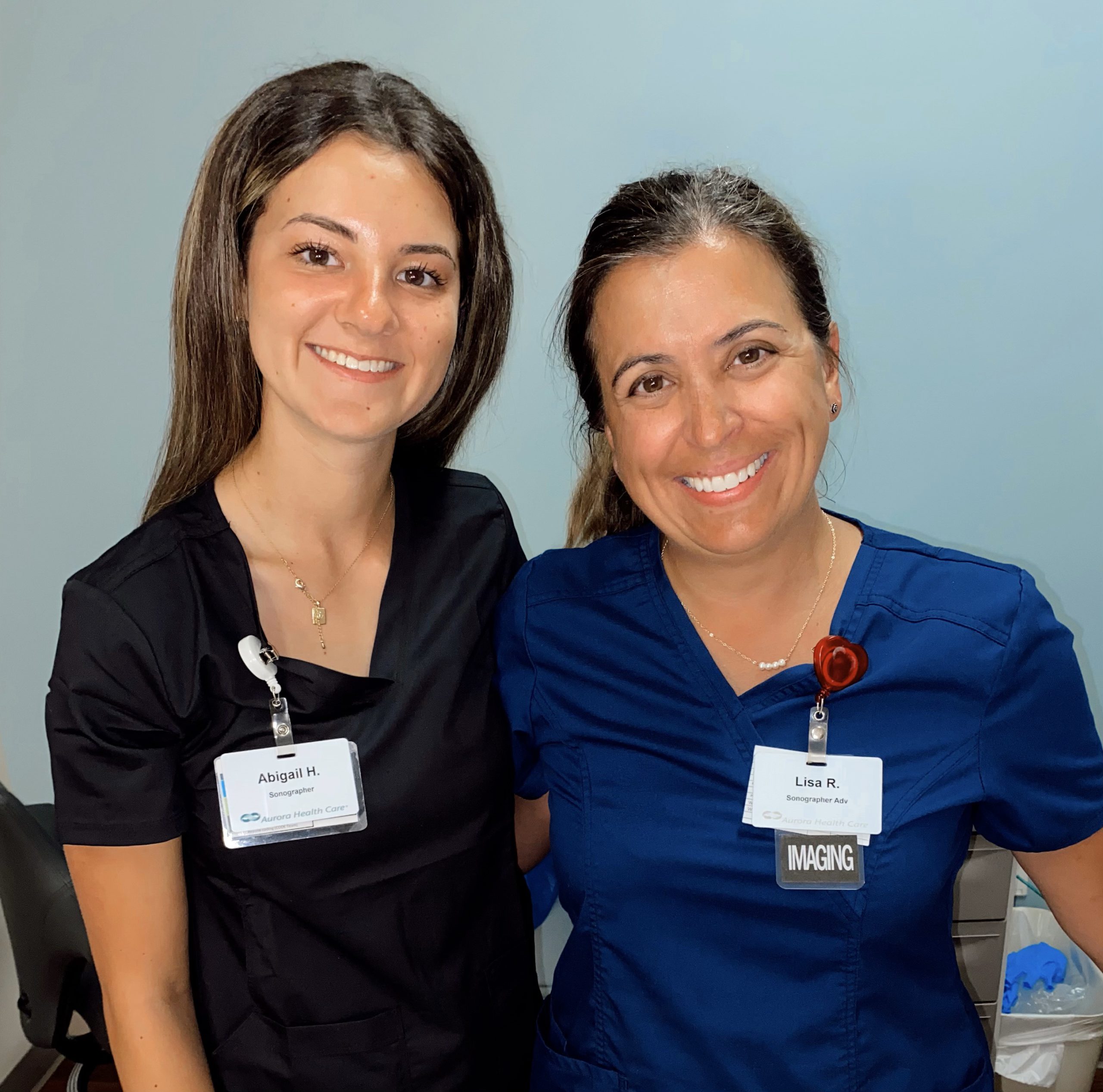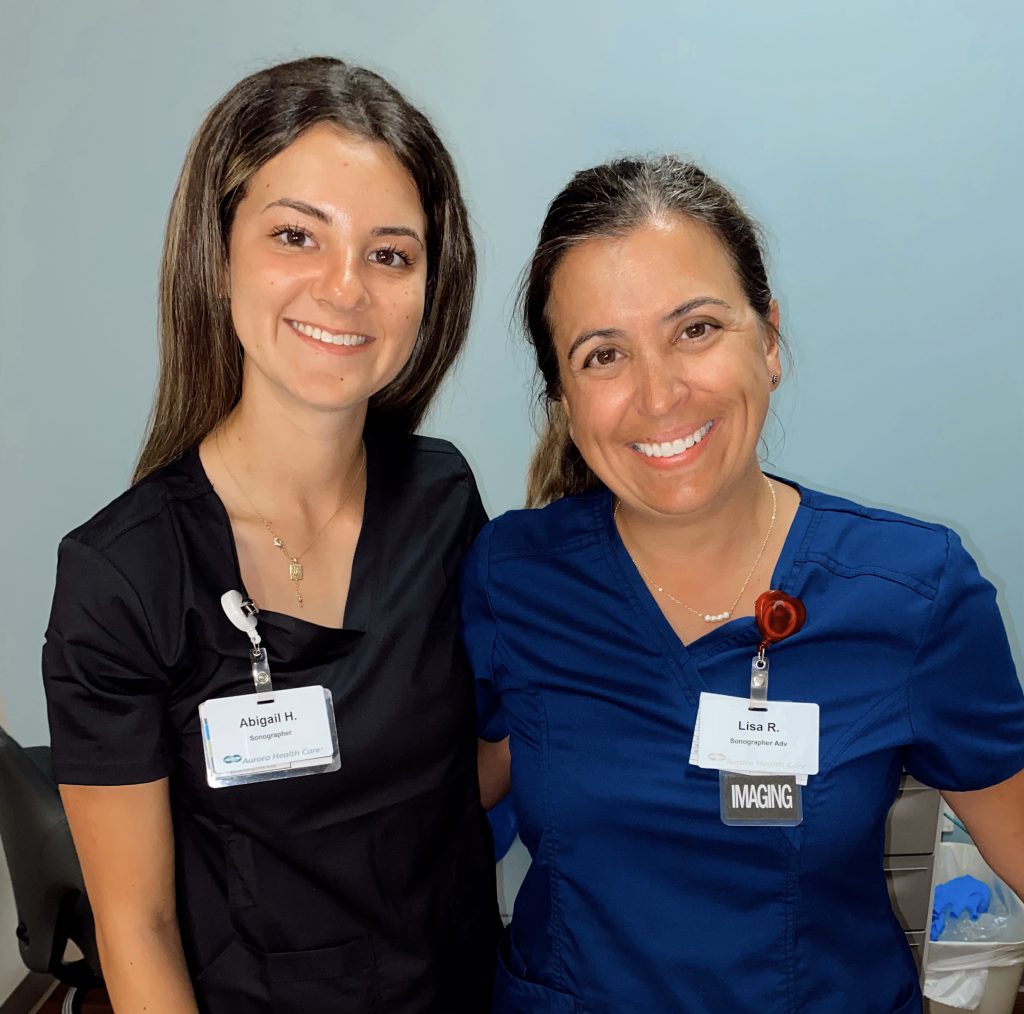
We asked recent DMS graduate Abby Hillner (’22) to share some thoughts about what she loves about her new profession—and what she loved about her Concordia experience.

What’s it like working with a former professor as a colleague?
I really enjoy working alongside my former professor, Lisa Reimer, who helped prepare me for a career in ultrasound. The CUW DMS program is a small, close-knit program, so you really get to know your instructors, which is helpful when it comes to employment opportunities and makes working as colleagues all-the-more fun! Lisa was a helpful recommendation for me when first applying to my current full-time position at the Aurora Germantown Clinic where she picks up hours. It’s also nice working together because we can review interesting ultrasound cases which takes me back to the classroom days. I love learning, so having Lisa as a knowledgeable resource with all her ultrasound experience is a privilege!
How well did the Concordia program prepare you for your profession?
My first job out of college was at Aurora St. Luke’s Medical Center, which is one of the largest hospitals in Wisconsin. At St. Lukes I performed tough exams such as transplants, hemodialysis mappings, grafts and much more. These exams aren’t typically encountered in a clinical setting. My first year at St. Luke’s was a challenge, as expected, but I made it through using the skills I learned while at Concordia. I was hired as an extern at St. Luke’s about five months before graduating, which transferred into a full-time position immediately after graduation.
In ultrasound, you will always come across difficult cases that require critical thinking to navigate. Concordia’s program taught me to consider the tools in my toolbox (ultrasound machine settings) and to think critically when scanning pathology or coming across an anatomical variant that is not frequently seen. Concordia’s program exposed me to thousands of exams as a student at various clinical sites including Ascension, Froedtert, and ProHealth, among others to train me to think critically. It’s nerve-racking being a new graduate because there is a level of independence and confidence that only comes with experience, but the skills I graduated with from CUW’S DMS program set me up for success.
What are some other thoughts on the CUW DMS program?
Concordia’s sonography program provided my class with a large variety of clinical sites so we could learn different exam protocols, work with technologists of all skill levels and be exposed to different specialties within the ultrasound world. My favorite part about the program was the small size and the ability to receive one-on-one instruction from my professors. We were able to schedule time to practice scanning in lab and the instructor was available to answer questions in-person or over the phone during the blocked time. The instructors had flexible office hours to go over questions related to didactic coursework as well. Instructors even visited clinical sites to review our progress and find areas we could improve upon. The amount of attention we received from instructors really showed their dedication to our success in the program.
Why should someone choose this profession?
Ultrasound is unlike other medical professions. It’s very user dependent so you truly feel like you are part of the diagnostic process. Our images help patients receive answers regarding the cause of their symptoms and we have the privilege of working closely with doctors and radiologists. There are a large variety of exams that we perform including (but not limited to) vascular exams, obstetrical exams and abdominal exams. A career in sonography is not only rewarding because of our involvement in the diagnostic process, but it also pays extremely well. There is a high demand for sonographers, so it has great opportunities for job growth and only requires four years of hard work and dedication to create an excellent and rewarding career. If you are passionate about patient care, hardworking, enjoy anatomy and can train yourself to critically think, a career in ultrasound is a solid fit.
Why did YOU choose this profession?
I chose ultrasound because I have a love for and gift of caring for people and have always been fascinated by the human body. I was also fascinated by ultrasound technology. Performing ultrasound exams requires a heavy level of training, as the diagnosis resulting from an ultrasound exam can determine whether or not medical intervention is necessary. With that comes great responsibility, which makes the career even more rewarding. There is a large variety of ultrasound exams, too, which makes each day on the job a little different. Four years of hard work was, without question, worth it.
What might surprise people about being a medical sonographer?
People are often surprised by the variety of exams sonographers perform and how specific the degree and training requirements are. You must have 1,680 clinical hours completed to graduate, in addition to successful completion of scan lab proficiencies and clinical competencies. People are also surprised at the physical demands of the job; it is important to establish sound ergonomic habits during training to protect your body from injury.
Want in?
Concordia University Wisconsin is a Lutheran higher education community committed to helping students develop in mind, body, and spirit for service to Christ in the Church and the world. To learn more about the Diagnostic Medical Sonography program, click the link below.